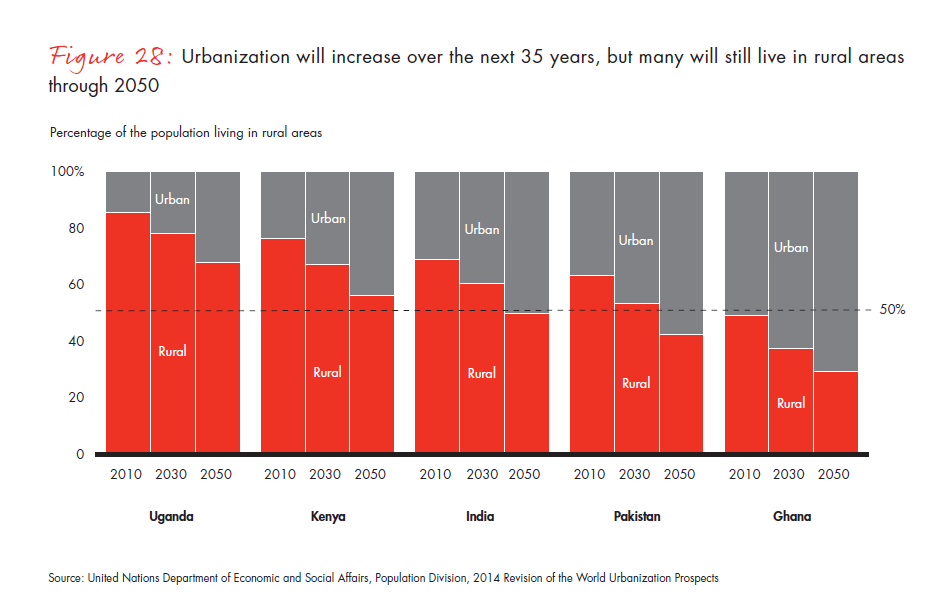Brief
As we noted in the introduction to this study, agriculture is the main livelihood for the rural poor across the world. This report has focused on how pioneer firms can help smallholder farmers adopt innovations that increase productivity and incomes. However, there are many interrelated topics that we have not been able to address or have only been able to cover in passing.
In the long run, is more productively farming on small plots of land the best way to address poverty? There is no simple consensus to such a broad question, but three interrelated issues at play should inform long-term investments in smallholder agriculture.
Urbanization
In the course of our research for this paper, we encountered a number of development professionals who raised concerns about our focus on smallholder farming. They emphasized the importance of helping subsistence farmers find alternative livelihoods, because many are structurally unable to meaningfully increase their family’s income through their labor on such a small amount of land. The most frequently cited trend was urbanization and the benefits experienced by smallholder farmers who could more productively use their unskilled labor in a restaurant or hotel or as a taxi driver. Undoubtedly, urbanization is a trend that will continue and, for some, will increase their incomes more effectively than increasing the productivity of their very small farm.
However, in most of the countries we focused on for this study, even by 2050, the majority of the populations will still be in rural areas and many people will likely be focused on agriculture as a livelihood (see Figure 28). As a result, the need to enhance productivity and generate a greater return on land and labor through adoption of new technologies will be critical over the next 30 years or more for the more than 1 billion people in these countries reliant on agriculture for their livelihood.1

Demographic change and farm size
Related to the point about urbanization was a common refrain that smallholder farming is simply not a long-term economically viable path out of poverty. Small farm sizes generate insufficient income to justify the capital investment in technologies, like tractors, that would help significantly increase productivity. Unfortunately, this trend may be worsening as population growth leads to familial land being apportioned to new generations in increasingly diminished shares.
Climate change
In our conversations with pioneer firms and smallholder farmers, many mentioned that once-regular rains and predictable growing seasons were now irregular and undependable. As a result, freshwater withdrawals from water systems (aquifers, rivers and lakes) are depleting access to agricultural water (see Figure 29). Environmental changes pose challenges for farmers around the world but disproportionately affect those without the means to quickly adapt. The issue of sufficient water for crops was pervasive across the countries we focused on: India, Pakistan, Kenya, Uganda and Ghana.

These significant trends are shaping the future of smallholder farming. To secure food supply, particularly for smallholders who rely on their production for a significant portion of their calories, the adoption of agricultural innovations is a political, economic and social imperative. Collectively, they point to the need to intensify agricultural productivity in an environment of increasingly diminished natural resources. As a result, the role of the pioneer firm in driving the adoption of agricultural innovations and growing prosperity is all the more important, now and into the future.
For a full list of interviews and acknowledgments, please view the PDF.

1 United Nations, Department of Economic and Social Affairs, Population Division, World Urbanization Prospects: The 2011 Revision, New York: United Nations, 2012.

